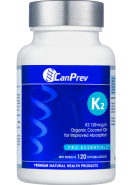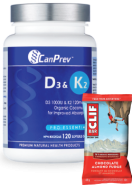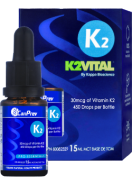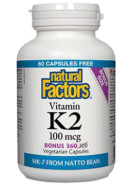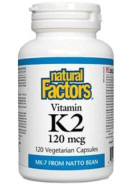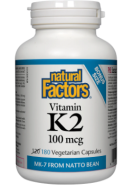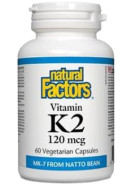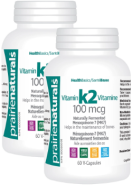Vitamin K + D - 90 Softgels - Organika
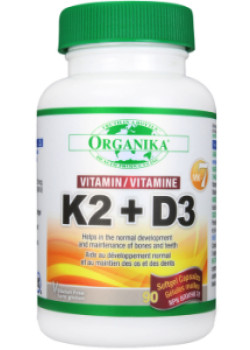
We're sorry, we no longer carry this item.
Check These out
Suggested, Similar, & Related Products:
Or, Shop our Latest Deals:
Shop Now >- 120mcg
- Vitamin K2
- 25mcg
- Vitamin D3
Soybean Oil, Glycerin, Gelatin, Purified Water
Format
 Softgels
Softgels
90 Softgels
Dosage
Take 1 softgel capsule per day with a meal and a glass of water.
Important Information
Consult a health care provider before use if you are taking blood thinners.
- Osteoporosis
- Bone health
- Mood disorders (Depression, SAD)
- Skin disorders (Eczema, Psoriasis)
- Immune support
- Autoimmune diseases
Related Videos
No Related VideosArticles by a naturopathic doctor.
Organika, formulators of Canada’s best-selling Collagen and marine collagen and Bone Broth supports skin and joint health. Organika's health products also include; Organika spirulina, Chlorella, Curcumin to support inflammation, Organika Enhanced Collagen Protein, and Adaptogens to provide balance. Shop Organika here at National Nutrition.ca for quality, Canadian-made supplements.
"Your back bones connected to your hip bone, your hip bones connected to your" Vitamin K intake?...
We've all heard about the relationship between calcium and bone health, but very few people know about the importance of Vitamin K. Vitamin K is required for the production of osteocalcin the protein web-like structure upon which bone is built.
Simply put, through osteocalcin, Vitamin K attracts calcium to bone tissue, playing a role in the formation, remodeling and repair of bone. This is especially important for menopausal women or those with a history of osteoporosis in their family. Osteoporosis is a skeletal disease which causes low mineral bone density or bone mass due to a progressive deterioration of bone. It leaves bone fragile and can increase susceptibility to debilitating fractures, such as hip and spine fractures.
Vitamin K also plays an integral role in blood clotting. It is responsible for the manufacturing of clotting factors, such as prothrombin and clotting factors VII, IX and X. These clotting factors play an essential part of hemostasis, the innate physiological process that prevents excessive blood loss from damaged blood vessels by first plugging and then repairing the damage. Ineffective coagulation can lead to hemorrhage and can be life threatening.
Vitamin K is a fat soluble vitamin made in two naturally occurring forms. Vitamin K1, also known as phylloquinone, is found in green leafy vegetables such as kale, spinach and broccoli, as well as fruits, such as avocado and kiwi. It is also found in vegetable oils, such as canola, soybean and olive oils. Vitamin K2 is another usable form made by our own gut bacteria, but these stores are small and are rapidly depleted without regular dietary intake of K1. Individuals taking large amounts of antibiotics which alter the balance of normal gut flora, are susceptible to deficiencies. Also at risk for deficiency are individuals with impairments in fat absorption, those with significant liver damage or disease and those taking vitamin K antagonist anticoagulant drugs.
Vitamin K deficiency results in impaired blood clotting, usually demonstrated by laboratory tests that measure clotting time (PTT, PT,etc.). Symptoms include easy bruising and bleeding that may be manifested as nosebleeds, bleeding gums, blood in the urine, blood in the stool, tarry black stools, or unusually heavy menstrual bleeding. In infants, a vitamin K deficiency may result in possibly life-threatening bleeding within the skull (intracranial hemorrhage).
Individuals who have a clotting disorder, which leaves them more susceptible to forming clots (ie; atherosclerosis), as well as those already taking anticoagulant drugs (such as warfarin), are cautioned against Vitamin K supplementation. These individuals must also be cautious when consuming large amounts of Vitamin K in their diet, as it will counteract the drug's effects.
Vitamin D
More and more doctors and Naturopaths are recommending that their patients boost their vitamin D supplements. Why? Because good recent research shows deficiencies are widespread, especially in the northern hemisphere where we don't get enough sun exposure for more than half the year!
Although at one time 400IU was considered appropriate for supplementation, many health care practitioners are now recommending 1000-4000IU/day, with doses as high as 10,000IU/day still being considered safe and necessary depending on the condition and assuming you are under the supervision of a healthcare provider.
It is fair to say that we are only just beginning to understand the immense difference that vitamin D can make in terms of everyday health and disease prevention.
Vitamin D plays an integral role in bone health, promoting our absorption of both calcium and phosphorus. For this reason, it is commonly used in the prevention and treatment of osteoporosis.
We are understanding more and more the importance that vitamin D is playing in supporting immune function. Vitamin D has the ability to modulate the immune response, rather than simply strengthen it. In cases of immune dysregulation (autoimmune disorders, cancer, psoriasis) it serves to balance the response, therefore decreasing the dangerous over-reaction to our own cells and tissues that is seen in many of these conditions. Research studying the use of vitamin D in influenza and various respiratory tract infections, has also showed some promising results. It is now considered one of the top supplements to use during cold and flu season to ward off the offending viruses and bacterium. Vitamin D deficiencies have been associated with an increased risk of influenza, as well as the common cold. The fat soluble vitamin has been shown to dramatically stimulate the expression of potent anti-microbial peptides, which exist in neutrophils, monocytes, natural killer cells, and in epithelial cells lining the respiratory tract. These cells play a major role in protecting the lung from infection.
Research on the effects that vitamin D status has on the incidence of cancer, particularly colorectal and other digestive system cancers, as well as female reproductive cancers, is also more than convincing. High vitamin D status was found to very significantly decrease the incidence of colorectal cancers in men (40%), as well as the incidence of other digestive system cancers. Vitamin D has been found to decrease proliferation, metastatic potential and angiogenesis of cancer cells, while simultaneously increasing differentiation and apoptosis.
Vitamin D has heart protective effects, as well. It has been shown to lower high blood pressure and is useful in the prevention of cardiovascular disease. Vitamin D is also being used in the management of Type II diabetes, as it has been shown to be involved in insulin secretion and glucose tolerance. Many mental disorders are now being correlated with vitamin D deficiency and supplementation is proving beneficial for many individuals suffering from depression, schizophrenia, seasonal effective disorder, manic/bipolar disorder and autism.
Vitamin D deficiency is considered less than 50 ng/ml of 25(OH)D, which is the active form of vitamin D in our bodies. Deficiency can occur with inadequate sun exposure, inadequate dietary intake, kidney or liver disease, and alcoholism. Elderly, dark-skinned, and obese populations, as well as those with fat malabsorption syndromes or inflammatory bowel disease, are also said to be at greater risk. Vitamin D deficiency causes rickets in children, leading to weak and deformed bones. In adults, deficiency can lead to osteomalacia, and osteoporosis, dental problems, muscle weakness and tooth decay.
When supplementing with Vitamin D, be sure to look for D3 (cholecalciferol) as it is significantly more efficient at raising 25(OH)D levels than the other form of D, D2 (ergocalciferol).
- Reviews
- POST A NEW REVIEW
















